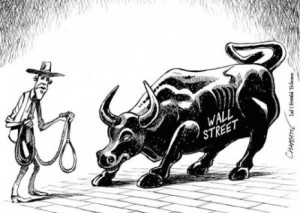July 28, 2014
 If you’re a movie buff and coincidentally enjoy watching the markets as well, it’s likely you’ve seen the movie Wall Street. The villain, Gordon Gekko, is a fictional stock broker who, while being exceptionally greedy, had a knack for managing investments. Albeit fictional, he became a huge symbol for all the negative aspects of a stock broker.
If you’re a movie buff and coincidentally enjoy watching the markets as well, it’s likely you’ve seen the movie Wall Street. The villain, Gordon Gekko, is a fictional stock broker who, while being exceptionally greedy, had a knack for managing investments. Albeit fictional, he became a huge symbol for all the negative aspects of a stock broker.
Australian Prime Minister, Kevin Rudd, even labeled the perpetrators of the 2008 financial crisis as “Children of Gordon Gekko”. The character is said to be loosely based on a collection of stock broker personalities including Michael Robert Milken who was indicted for racketeering and securities fraud back in the late 80s.
Obviously, this is not how the majority of stock brokers behave, so don’t let this movie skew your perception of the career. Rather, learn the true nature of the profession and gain insights from some of the most successful brokers and hedge fund managers who intend on building positive legacies for themselves. Here are four notable individuals who fit that description:
Chris Gardner
Well known for the movie “The Pursuit of Happyness”, Chris Gardner worked hard at Dean Witter Reynolds as an unpaid intern while homeless and caring for his only son in 1981. They would sleep in bathrooms and church shelters and he would be the first one in and last one out of the office aggressively calling potential clients. He eventually was able to pass the licensing exam necessary to becoming a stock broker. He later left Dean Witter Reynolds to work for Bear Stearns and became one of the top earners of the company. He now owns his own company Gardner Rich & Co LLC and has a net worth of about $60 million.
Ray Dalio
Born in Queens, New York, when he was 12 he bought $300 worth of shares in Northeast Airlines and ended up tripling his investment after the company merged. He earned his BA from Long Island University and his MBA from Harvard. Ray began his career in finance investing in commodity futures on the New York Stock Exchange. He also worked as a futures trader and a broker at Shearson Hayden Stone. He now has a net worth of about $12.5 billion and runs the largest hedge fund firm, Bridgewater Associates. You can find an informative animated video titled “How The Economic Machine Works” on YouTube where he shares his extensive experience of the investment world.
David Tepper
He has been listed by Forbes Magazine as one of the 25 Highest-Earning hedge fund managers in 2013 and earned a whopping 61% return focusing on distressed bonds in 2001. He began his career in finance in the treasury department of Republic Steel in Ohio and later became a credit analyst at Goldman Sachs. The hedge fund firm he leads is Appaloosa Management and has earn substantial returns over the course of its history. In 2012, the firm earned a 30% return because of pinpoint exchanges on certain securities. He has a net worth of about $7 billion and engages in various philanthropic activities mainly in education and hunger. In 2003, he made a considerable $55,000,000 donation to Carnegie Mellon University’s business school. He’s leaving quite a legacy.
Bruce Kovner
This hedge fund manager has been around the block a few times, literally. He became a taxi cab driver at age 31 after quitting his Harvard PhD studies because of writers block. It was then when he decided to engage in derivatives by investing $3,000 from his MasterCard into soybean futures contracts. He didn’t accurately assess the risk of the investment when it grew to $45,000 because he waited till the price dropped to $23,000 before selling. He cites that experience as an important lesson in risk management. He eventually became a trader at Commodities Corporation which is now connected to Goldman Sachs. Currently he’s the chairman of Juilliard where he learned how to play the harpsichord. His net worth is $4.3 billion.
If interested in learning more about a career as a stock broker, visit http://www.stockbrokersalary.biz to read up on informative articles related to the profession. Also, find out how to market yourself as a stock broker to increase your client base.
Tags:
Broker,
economy,
financial planning,
Foreign Exchange,
Funds,
money,
stock,
Trading
July 21, 2014
 Running any kind of business includes an element of risk, and this risk is all the more evident when you are running a small business. Considering the current economic climate, saving money has run to the top of many businesses’ to do lists, and it’s not actually as hard as you may think! Some of these tips are as simple as changing the way you use your phone system at work, and communication specialists like Com2 can help you save money by implementing a cheap and efficient telecommunication system. If you’re eager to hear some more, here are some more tips you might want to think about implementing in your business, as these simple steps will allow you to save a decent amount of money.
Running any kind of business includes an element of risk, and this risk is all the more evident when you are running a small business. Considering the current economic climate, saving money has run to the top of many businesses’ to do lists, and it’s not actually as hard as you may think! Some of these tips are as simple as changing the way you use your phone system at work, and communication specialists like Com2 can help you save money by implementing a cheap and efficient telecommunication system. If you’re eager to hear some more, here are some more tips you might want to think about implementing in your business, as these simple steps will allow you to save a decent amount of money.
Buy in bulk
Buy essentials for the office in bulk, whether it be from wholesalers or your local office supplies store. These items include reams of paper, packets of pens, notebooks and even printer cartridges. Buying in bulk will normally get you a discount on these products, and will also increase productivity throughout the workplace –your employees will not have to waste precious time buying these essentials when you run out of them!
Don’t buy office furniture from retailers
There are now many other ways to get hold of furniture without having to pay a fortune. The advent of Craigslist and similar sites has allowed hundreds of people to sell their unwanted goods online, and this is the perfect place for you to score some normally expensive products for a relatively inexpensive price. Of course, always remember to be careful when you are dealing with strangers in an online forum.
Broaden your advertising horizons
Word of mouth is widely regarded as the most powerful form of advertisement, yet many businesses do not use this utility to the best of their ability. One way to increase word of mouth advertising might be through the introduction of a loyalty system whereby clients who refer new customers receive a reward of some kind. There are many other ways to boost this kind of advertising, especially considering the power of the internet and how fast news can travel through this medium. If your business has many different products, you might also want to try cross promotion – advertising more than one product at the same time, so as to get the most out of your advertising budget.
Use free products when you can
There are so many free tools out there that businesses can use to help them in their everyday tasks. Google provides free email, calendar and communication services, which may be cheaper than shelling out money for business branded emails, and there are many other task management platforms and templates that are also available for free.
These are just some steps you can take if you need to save money for your small business. Of course, these tips can be applied to larger businesses, as well as at home. It is always good practice to exercise caution when it comes to the spending of money, just in case something out of your control or unexpected happens to the business.
Now we want to hear from you. If you run any kind of business, whether it be large or small, what kind of things have you been doing to save money? In your experience, what has worked and what really hasn’t? Leave a comment down below and help out your fellow businessmen and women.
Tags:
budgeting,
Business,
cash,
economy,
financial planning,
investments,
money,
savings
May 4, 2014
 It doesn’t matter how great your product, your services, or your people – your business can’t be successful unless you have the right operating systems and frameworks in place.
It doesn’t matter how great your product, your services, or your people – your business can’t be successful unless you have the right operating systems and frameworks in place.
Ensuring that you have the right financial management systems is one of the most important things you can do to support the development of a sustainable business.
Your financial management systems don’t have to be overly complex, they just need to be effective and robust – providing you with the information and oversight that you need to monitor performance and inform your decision-making.
Effectively using online banking for your business is one of the easiest steps to take, and one of the first areas that you should focus on.
Here are four key benefits to business banking online:
1. It’s convenient. You can access your accounts when it suits you. You can pay bills, pay salaries, or track invoice payments at any time of the day or night.
2. It’s secure. Most online business banking systems now use a two-step log-on process to ensure that only authorised users are able to access your accounts. Industry figures demonstrate that incidences of fraud are much lower for online business banking compared to other banking channels.
3. Retain payee information. Your online banking enables you to save the account details and reference information for suppliers that you make regular payments to. This saves you time and ensures a consistent account reference for tracking purposes.
4. Create reports. Through your online banking you can easily export the detail of your transactions (from your online account statements) and then use them to analyse your expenditure patterns or quantify how much you are spending with specific suppliers.
Of course, online business banking also has quite a lot of benefits for banks and financial services providers – you are helping them to reduce their cost base by completing self-service transactions, and you are reducing the demands on their branch and call centre networks.
By using online banking, you are also helping your bank know more about you and your business. That will help them tailor services and products to better suit your needs and assist them in selling you things that you’re more likely to need. According to research from MISYS Banking Systems, banks are generating 25% of their sales volume via digital channels such as online banking, so it’s clear that banks are going to be keen to encourage more businesses to switch across to online business banking.
It’s time to embrace the technology – log on and help your business grow.
Tags:
Business,
Business Ideas,
economy,
financial planning,
money,
Online Banking
May 2, 2014
 Once your income exceeds your outcome it is time to start thinking about clever financial management that will be efficient tool for wealth building. It is important not just save a certain sum of money and to preserve in a jar poste restante but to make each saved dollar work for you and to make more dollars. This is the point when you have to equip yourself with the knowledge of investment principles, strategies and tools, when you have to find a personal financial counselor, to take advantage of personal loan service, and to track situation on the market all the time.
Once your income exceeds your outcome it is time to start thinking about clever financial management that will be efficient tool for wealth building. It is important not just save a certain sum of money and to preserve in a jar poste restante but to make each saved dollar work for you and to make more dollars. This is the point when you have to equip yourself with the knowledge of investment principles, strategies and tools, when you have to find a personal financial counselor, to take advantage of personal loan service, and to track situation on the market all the time.
Your daily activities may not leave you much time to pay it to managing your wealth especially if you have a business which demands 100% of your presence. But successful investment requires much technical knowledge, hours of meticulous analyzes and ability to predict the market. Catching this all is not an easy task that is why it is a great idea to find somebody who will professionally help you to manage your money. It is true that if you wisely choose a wealth management advisor today this will turn in high income tomorrow. It is much better to regularly pay some fee to highly skilled financial manager then to lose pile of cash while making mistakes due to lack of time or knowledge.
Picking up a good advisor is not as easy task as it may seem because except of knowledge this person should emotionally fit you. You may change several experts until you find one and the best. That is why it is important not to be afraid to refuse working with the person if you feel that your money is not in a safe place. Remember that this is you who should take charge of your capital and take all financial decisions. That is why you need to find a person who will provide you with trustworthy and relevant information on time. Here are some requirements that usually apply to any financial counselor:
- Personal wealth manager should be aware of all lucrative investment opportunities which are presented at the market. The world is changing all the time and that means that opportunities may appear at any second. This is the task of the manager not to blow up the chance to multiply your capital.
- Your advisor should always inform you about investment opportunities and market trends so that you could make the last decision. He should also suggest you the best strategies and to explain such choice so that you could understand what you are doing.
- Personal advisor should be a professional in financial area and to have solid knowledge concerning economic principles and vehicles, multiplier mechanisms; he should also have ability structural analyze financial disclosure and to make relevant predictions.
- Wealth manager should also have the ability to clearly express his thoughts, ability to understand and to consider your preferences to flexibly respond in challenging situations.
- Using customized approach to you as a customer makes financial expert the most valuable investment that you would decide to do.
And the last thing which you need to remember is that financial manager is interesting in your wealth increasing when it comes to his interests. Don’t forget to generously reward your personal advisor if he succeeds to hit the jackpot. This will stimulate him doing it again and again and this will stimulate your wealth growing and growing.
Tags:
Business,
economy,
financial planning,
investment,
money,
personal finance
March 12, 2014
 While there are still a number of consumers who have not filed their tax returns for the year at this point, there nonetheless remain millions who have turned in these documents and are anxiously awaiting what they hope will be sizable refunds. However, not all of them will necessarily know how best to spend those funds once they receive them, so it might be wise to look into a few ways to spend that money wisely.
While there are still a number of consumers who have not filed their tax returns for the year at this point, there nonetheless remain millions who have turned in these documents and are anxiously awaiting what they hope will be sizable refunds. However, not all of them will necessarily know how best to spend those funds once they receive them, so it might be wise to look into a few ways to spend that money wisely.
Instead of buying a new TV or going on a clothes shopping spree, it’s often much wiser for Americans to concentrate any tax refund money on improving their financial standing overall. Perhaps the best method for doing this, in a number of ways, is to pay down outstanding debt of almost any kind. This will have the dual purpose of both reducing the cost of monthly payments faced for having such balances outstanding, but also improving their credit scores. Usually, it’s the wisest idea to pay off the debt that comes with the highest interest rate (usually credit card balances) because of the ways in which big rates can tack on additional debt in a shorter period of time. The larger the refund, the more substantially debt can be cut, and thus the pressure on a household budget can be reduced.
What about consumers who don’t have big debts?
Of course, not everyone has thousands of dollars worth of credit card bills to deal with, or might be constrained by parts of mortgage or auto loan agreements which state they cannot pay them off before a certain date. For those people, it might be wise to simply put a tax refund into savings, instead. This, though, can be approached in a number of different ways. It could be used to build emergency savings, in the event of a problem that arises down the road, or they could simply put them into retirement accounts that will help to secure their financial futures.
For those who haven’t yet filed their returns but want to maximize their refunds, it might be wise to speak with a tax professional who may be able to help identify some potential deductions that could help to increase the amount of money they receive back from the IRS.
Tags:
budgeting,
economy,
financial planning,
Income Tax,
investments,
money,
tax,
Tax Returns
 If you’re a movie buff and coincidentally enjoy watching the markets as well, it’s likely you’ve seen the movie Wall Street. The villain, Gordon Gekko, is a fictional stock broker who, while being exceptionally greedy, had a knack for managing investments. Albeit fictional, he became a huge symbol for all the negative aspects of a stock broker.
If you’re a movie buff and coincidentally enjoy watching the markets as well, it’s likely you’ve seen the movie Wall Street. The villain, Gordon Gekko, is a fictional stock broker who, while being exceptionally greedy, had a knack for managing investments. Albeit fictional, he became a huge symbol for all the negative aspects of a stock broker.




Recent Comments